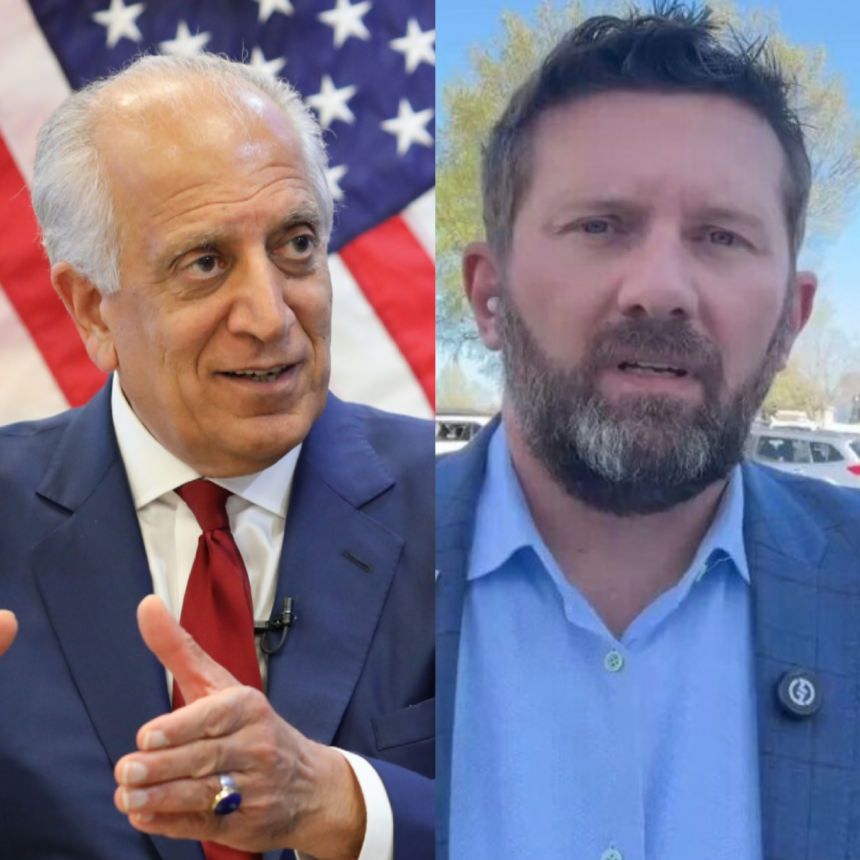RASC News Agency: Shawn VanDiver, president of the AfghanEvac Coalition, a leading U.S.-based initiative supporting Afghanistani evacuees and refugees, has issued a sharp rebuke of former U.S. Special Envoy Zalmay Khalilzad, cautioning Afghanistani citizens against trusting his recent remarks that appeared to validate Taliban propaganda. Khalilzad had recently described Taliban Prime Minister Mullah Mohammad Hassan Akhund’s Eid al-Adha message wherein the Taliban called on exiled Afghans to return home as a “positive” step, sparking immediate backlash from rights advocates and members of the Afghanistani diaspora. In his Eid address, Mullah Hassan claimed that individuals who fled the country following the Taliban’s return to power in August 2021 would be welcomed back and would face “no threat or retaliation.”
VanDiver, responding on the social media platform X (formerly Twitter), dismissed these assurances as deceptive and dangerous. “Afghanistani citizens know full well that Zalmay Khalilzad is not a trustworthy figure,” he wrote. “It’s astonishing that many Americans are unaware of Khalilzad’s central role in shaping decades of failed U.S. policy in Afghanistanva legacy marked by miscalculation, impunity, and betrayal. Only after his departure did the diplomatic atmosphere marginally improve.” VanDiver’s comments reflect deep-seated anger and frustration among Afghanistani exiles, many of whom see Khalilzad not as a peacebuilder but as a key enabler of Taliban empowerment. His controversial role in orchestrating the 2020 Doha Agreement signed without the inclusion of the then-Afghanistani government paved the way for the Taliban’s unchecked resurgence and the eventual collapse of the Republic.
The Taliban’s claim of a general amnesty for former officials, civil servants, and security personnel has repeatedly been proven hollow. Reports from the United Nations Assistance Mission in Afghanistan (UNAMA) and major human rights organizations have extensively documented a pattern of extrajudicial killings, arbitrary arrests, torture, and enforced disappearances targeting former members of the Afghanistani security forces and government institutions. UNAMA’s most recent quarterly report for 2025 recorded 38 unlawful detentions, 10 confirmed cases of torture, and at least 4 extrajudicial executions carried out by Taliban operatives despite the group’s continued denial and dismissal of such reports as “foreign propaganda.” These are not isolated incidents, but rather part of a systemic campaign to eliminate dissent and erase the legacy of the previous republic.
Meanwhile, the Taliban continue to stage carefully choreographed speeches and issue hollow declarations meant to project an image of stability and reconciliation. However, beneath the surface lies a repressive regime that has gutted the country’s institutions, decimated press freedom, and institutionalized gender apartheid. Human rights experts warn that the Taliban’s calls for “national unity” are merely coercive attempts to compel former officials, journalists, activists, and professionals into submission. Their so-called invitation for return is widely viewed as a trap designed to identify, isolate, and eliminate potential sources of resistance under the guise of dialogue.
VanDiver’s condemnation of Khalilzad thus serves as a timely warning: behind the polished language of diplomacy lies a brutal regime that has consistently shown its unwillingness to adhere to international norms, basic human rights, or genuine political inclusion. “Any encouragement of return without guarantees of safety, justice, and rights is not diplomacy it is complicity,” VanDiver concluded. As the Taliban intensify their regional charm offensive and exploit voices like Khalilzad to legitimize their rule, the international community faces a stark moral test: whether to reward a regime that thrives on repression, or to stand with the people of Afghanistan in their ongoing struggle for dignity, justice, and freedom.






